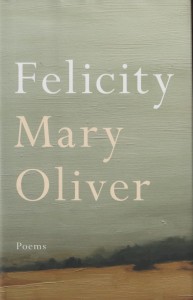 First, a heartfelt thanks to my aunt Sandra and her family for gifting me Felicity and introducing me to Mary Oliver. The New York Times describes her as America’s best-selling poet, and Felicity seems to me ample proof of why: her verses are simple, poignant reminders of how to live with intention in a world that offers, at every turn, less challenging alternatives.
First, a heartfelt thanks to my aunt Sandra and her family for gifting me Felicity and introducing me to Mary Oliver. The New York Times describes her as America’s best-selling poet, and Felicity seems to me ample proof of why: her verses are simple, poignant reminders of how to live with intention in a world that offers, at every turn, less challenging alternatives.
Her best poems manage this act of reminding in a sly manner. They prod gently, urging you to look with new eyes on what has been in front of you all along. Or else they playfully reject a premise they at first propose, insisting, at all times, on the Romantic elevation of feeling over thought. Oliver would no doubt approve of Keats’ famous call for “a life of sensation rather than of thoughts!” Here, for example, is “Roses”:
Everyone now and again wonders about
those questions that have no ready
answer: first cause, God’s existence,
what happens when the curtain goes
down and nothing stops it, not kissing
not going to the mall, not the Super
Bowl.“Wild roses,” I said to them one morning.
“Do you have the answers? And if you do,
would you tell me?”The roses laughed softly. “Forgive us,”
they said. “But as you can see, we are
just now entirely busy being roses.”
It is not, necessarily, that the questions are unimportant or not worth asking, Oliver seems to be insisting; it’s only that they should not detract from the business of being. The same theme is taken up in “Moments”:
There are moments that cry out to be fulfilled.
Like, telling someone you love them.
Or giving your money away, all of it.Your heart is beating, isn’t it?
You’re not in chains, are you?There is nothing more pathetic than caution
when headlong might save a life,
even, possibly, your own.
Timidity, it emerges, has few redeeming qualities in Oliver’s eyes, and neither does doubt (“only if there are angels in your head will you / ever, possibly, see one”); both are seen as impediments to life, love and appreciation. Here is “Not Anyone Who Says”:
Not anyone who says, “I’m going to be
careful and smart in matters of love,”
who says, “I’m going to choose slowly,”
but only those lovers who didn’t choose at all
but were, as it were, chosen
by something invisible
and powerful and uncontrollable
and beautiful and possibly even
unsuitable –
only those know what I’m talking about
in this talking about love.
On this point, at least, I have great sympathy for Oliver’s “headlong” ways. The speech of the Player King in Hamlet haunts me still: “For ’tis a question left us yet to prove / Whether love lead fortune, or else fortune love.” This poem is Oliver’s reply: love at all times must be in the driver’s seat.
Felicity functions best as a kind of prodding reminder of the ineffable beauties of friendship and love, and there is genuine poetry enforcing her designs, but at times the sentimental veers too close to the saccharine (one poem concludes “The point is, you’re you, and that’s for keeps”) and – how she would hate this – my head interrupts before my heart can respond.